February Monthly Meeting Recap:
Mr. Frank Nelson with Missouri Dept. of Conservation Presented on World Wetlands Day
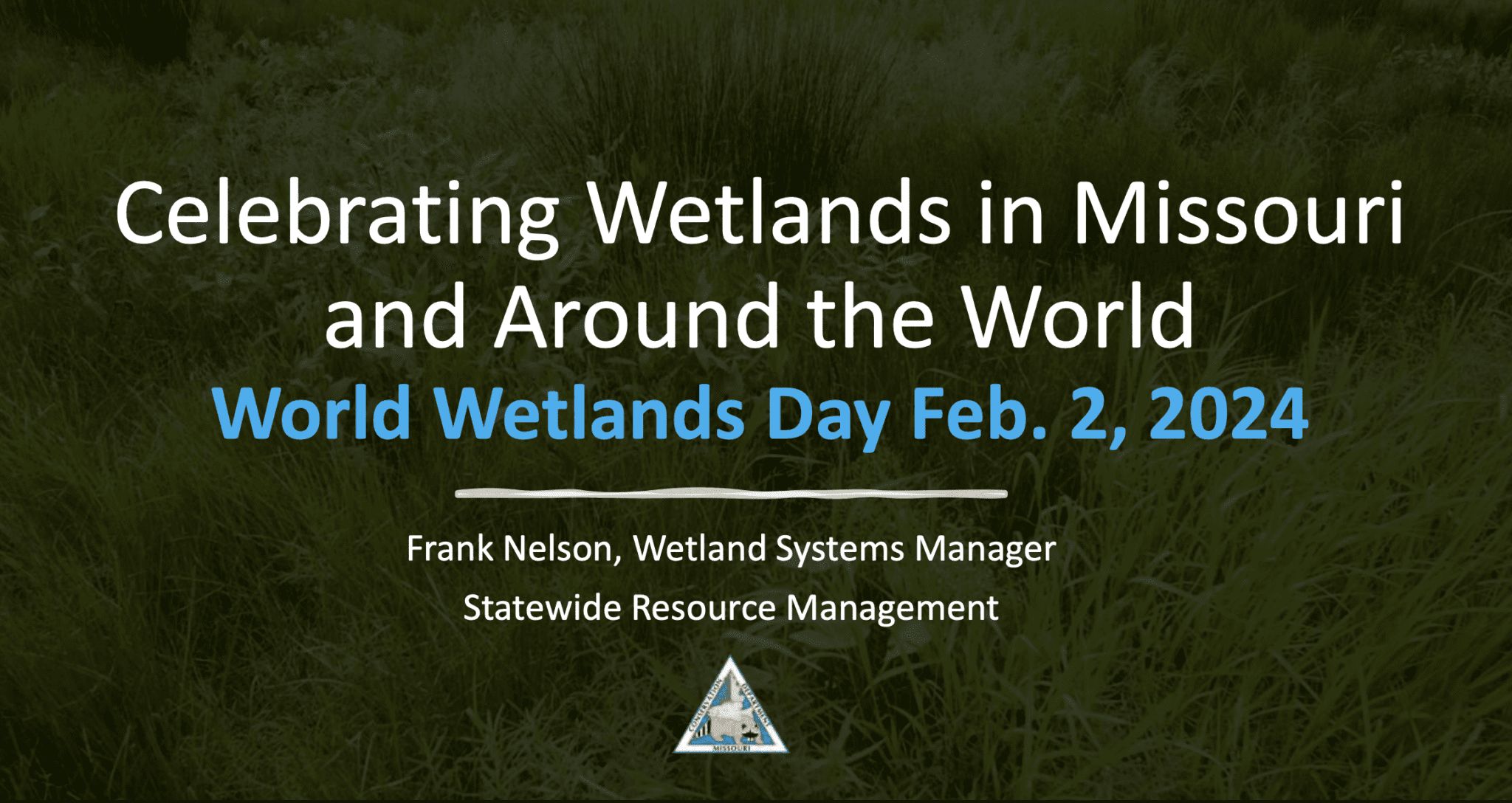
Our February Meeting was Friday, February 2nd, at the Watershed Center!
Frank Nelson is the Wetland Systems Manager with the Missouri Department of Conservation. Mr. Nelson gave background on World Wetlands Day, noting that it was adopted by the United Nations as an International Day in 2022 and has been celebrated every February 2nd since 1997 by Wetland enthusiasts. He said the 2024 theme is Wetlands and Human Wellbeing, as they provide water, livelihoods, culture, food, climate, and biodiversity benefits.
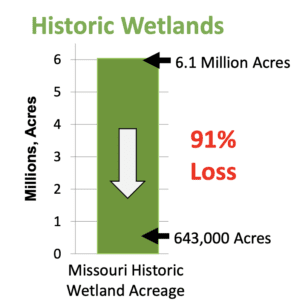 Currently, wetlands cover 6% of the Earth’s surface, and historically, Missouri had 6.1 million acres of wetlands, but we have experienced a 91% loss to just 643,000 acres. He said that wetland conservation includes a gradient of conditions, including small natural communities, engineered wetlands, nature-based solutions, and engineered bio-filters.
Currently, wetlands cover 6% of the Earth’s surface, and historically, Missouri had 6.1 million acres of wetlands, but we have experienced a 91% loss to just 643,000 acres. He said that wetland conservation includes a gradient of conditions, including small natural communities, engineered wetlands, nature-based solutions, and engineered bio-filters.
Mr. Nelson said that wetlands provide most of our freshwater, with 2.5% of the water on Earth being freshwater and <1% being accessible for direct human use. Wetlands are historically essential for food security, and we could think of them as not just wildlife habitats but working farms. They could also provide protection against extreme weather and support climate stabilization, as they store more carbon than any other ecosystem on Earth.
Mr. Nelson said that wetlands also provide jobs and help mitigate poverty, with one in eight people making their livelihoods around them. He said research shows that wetlands also positively impact mental well-being, providing ample recreational opportunities. 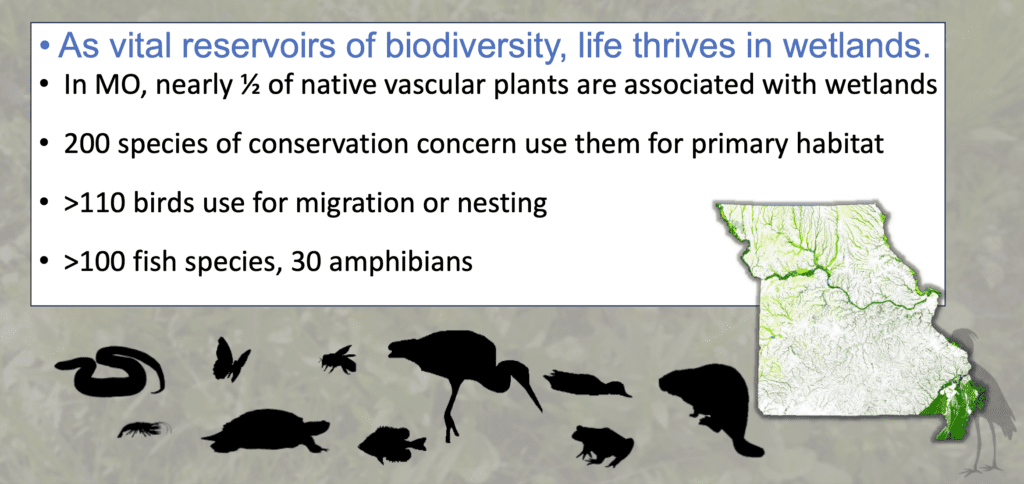
They are vital reservoirs of biodiversity, “40% of the world’s plant and animal species live or breed in wetlands.” which translates into the quality of life for humans with food security, medicines, industry boosting, and climate protection. He also touched on the cultural importance of wetlands, citing many ancient civilizations and the recreation that shapes our local culture today.
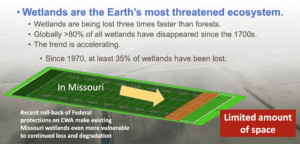 Mr. Nelson stressed that Wetlands are the Earth’s most threatened ecosystem, and they are being lost three times faster than forests. He compared Missouri’s wetland challenge to being in the red-zone of a football field, saying that this is very bad as we are on the defensive team.
Mr. Nelson stressed that Wetlands are the Earth’s most threatened ecosystem, and they are being lost three times faster than forests. He compared Missouri’s wetland challenge to being in the red-zone of a football field, saying that this is very bad as we are on the defensive team.
He said that rather than focusing on limitations of individual rights, we must flip emphasis to understand our responsibilities for each other. We must act now, together to attract the investments needed to conserve and restore them. We can ensure their sustainable use by managing them wisely, creating a “ripple effect.” He gave examples of these efforts in our community, citing Watershed Natives, GrowNatives, and Springfield and Greene County’s Integrated Plan, and ended by saying Happy World Wetlands Day! 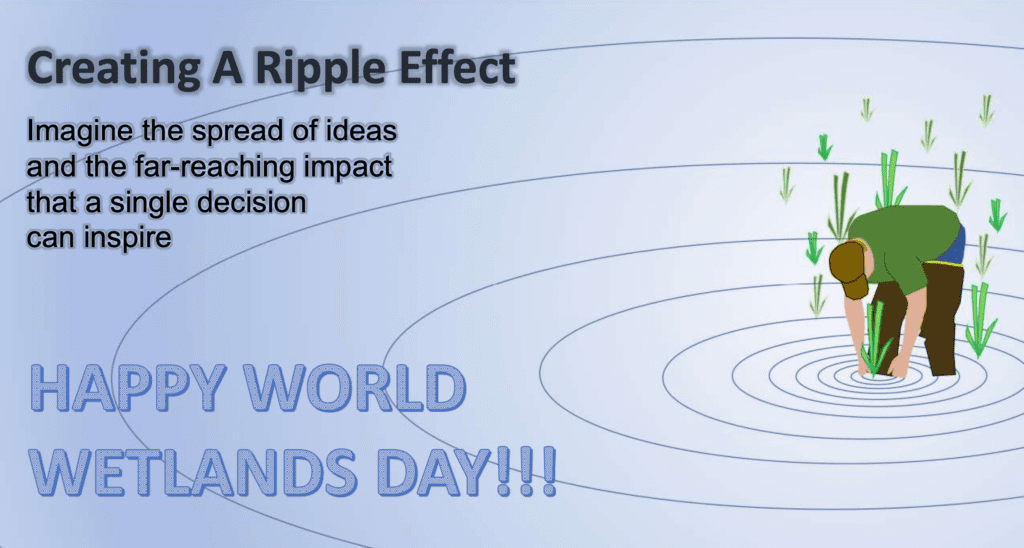
National Weather Service Quarterly Update:
Mr. Steve Runnels gave updates on our state of drought. He said that the drought has been on a downward swing when compared to 2022 and that most of the state has had significant rainfall except for our area. Mr. Runnels said that the odds are favoring above-normal weather this month. He also gave updates on the continuing NWS Flood inundation mapping initiative.
Regional Updates:
Mike introduced the new Watershed Conservation Corps NPS crew. Christy Wilder with Watershed Natives said that there are two part-time internships open in the program, applications are due February 9th. Matt Taylor with Fellows Lake said they are taking crew member applications for 15-30 hours a week over the summer, applicants must be 18 years or older. Mike Chiles said they are seeking an intern at Rockspan Farm to help with their tree farm as they try tapping various species for syrup. Rob Hunt with The Nature Conservancy said that Denali agreed to pump-out wastewater ponds in Newton County. David Coonrod said to pay attention to changes in local water bills.

